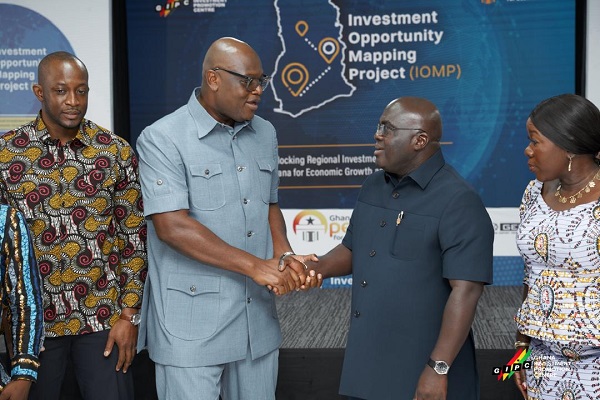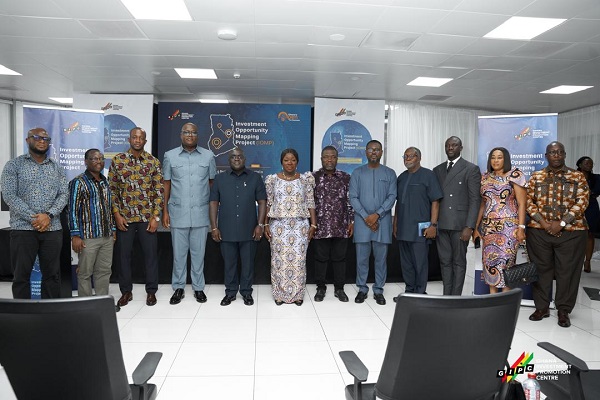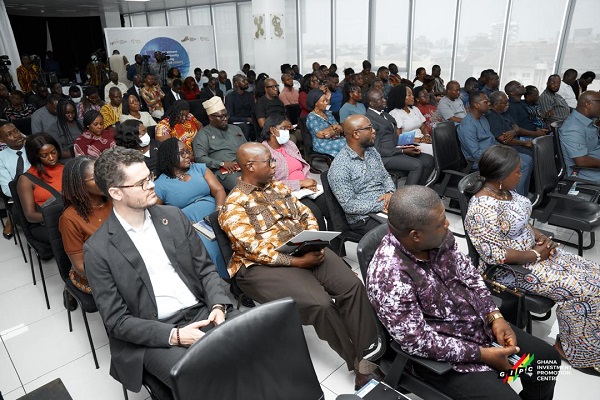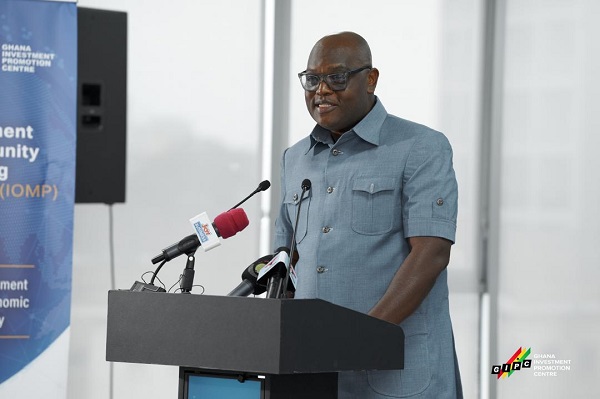GHANA has taken a bold step to address its longstanding investment disparities in the 16 regions and unlock the country’s enormous economic potential with the launch of the Investment Opportunity Mapping Project (IOMP).
The project will identify, assess and document viable investment opportunities across all 261 districts within the country’s 16 regions to provide a comprehensive view of the untapped economic potential.
Aside from the mapping the investment opportunities, it will also conduct regional investment roadshows, make presentations for regional leadership in investment, as well as expanding the Ghana Investment Promotion Centre’s (GIPC) presence in the regions.
The project would also put together, the investment portfolios of metropolitan, municipal and district assemblies, conduct the Ghana Diplomatic Investment Drive, create the Investment Opportunity App, make 24-Hour Economy investment pitches and organise the Ghana International Investment Summit (GIIS).
Implemented by the Ghana Investment Promotion Centre (GIPC) in partnership with the Ministry of Trade, Agribusiness and Industry (MOTAI) and the Ghana Export Promotion Authority (GIPC), the project is expected to promote equitable development by providing both local and foreign investors with targeted and actionable information.
This will support Ghana’s broader economic development goals such as the 24-Hour Economy and Accelerated Export Development initiative (24H+), job creation and the Sustainable Development Goals (SDGs).

Decentralising economic development
Speaking at the launch of the project in Accra last Thursday, the Chief of Staff, Julius Debrah, said the initiative marked the beginning of a deliberate and ambitious efforts to uncover the untapped economic treasures across Ghana's districts and regions.
“This launch reflects our shared commitment to decentralising economic development and promoting region-specific investment,” he said.
Mr Debrah explained that for too long, the country's investment inflows, particularly Foreign Direct Investment (FDI), had been heavily concentrated in a few urban centres, with about 70 per cent centralised in the Greater Accra Region.
He said that while some investment flows had trickled into Kumasi, Takoradi and Tamale, most regions remained underrepresented and underleveraged in the national investment story.
“As a result, these regions' unique economic assets have yet to be fully harnessed. The imbalance has contributed to uneven development, limited job creation in rural communities and underutilised local potential in other regions.
“The IOMP directly responds to this challenge by offering a data-driven district-by-district roadmap to guide local and international investors to where the opportunities are and where they are most needed,” Mr Debrah stated.
He added that the initiative would ensure that every Ghanaian, regardless of location, had an equitable chance to benefit from investment and economic growth.

Reversing decline in FDI
The Chief Executive Officer (CEO) of the GIPC, Simon Madjie, revealed that from 1994 to 2024, the GIPC registered 6,909 companies with a cumulative investment value of $51.55 billion, however, in recent years, Ghana had witnessed a decline in FDI inflows.
He said the GIPC’s annual recorded FDI fell from $3.61 billion in 2017 to just $617.6 million in 2024.
Mr Madjie said reversing the trend remained a top priority for the GIPC, especially in today’s rapidly evolving global investment landscape, where competition for capital had intensified, investor priorities shifted towards greater transparency and sustainability, and capital flows were increasingly directed towards well-defined project-specific opportunities.
“In this context, Ghana must move beyond general promotion to offer a compelling, data-driven and actionable investment proposition.
That is precisely what we seek to achieve with the IOMP: strategically positioning Ghana’s districts and regions as credible investment destinations with clearly identified and bankable opportunities,” Mr Madjie added.

Industrialisation
The Minister of Trade, Agribusiness and Industry, Elizabeth Ofosu-Adjare, said her ministry would leverage the IOMP to grow the country’s export base beyond raw materials and into value-added products.
She explained that the investment opportunities identified and profiled would attract high-impact investment into priority sectors such as food processing, textiles, pharmaceuticals and light industrial manufacturing to enhance Ghana’s active participation in global and regional trade.
“The ministry is aware that Ghana’s ability to benefit from the African Continental Free Trade Area (AfCFTA) does not rest on trade policy alone, but also depends on our capacity to produce competitively, export consistently and scale regionally. The IOMP will enable us to do precisely that,” she said.
Mrs Ofosu-Adjare added that by bringing investment-ready projects to the surface at the district level, it would help create the kind of distributed, decentralised production infrastructure needed to plug into continental value chains.
